普通法-案例分析笔记
法律案例分析必背(3篇)

第1篇一、引言法律案例分析是法学教育中不可或缺的一部分,它能够帮助学生将理论知识与实际案例相结合,提高分析问题和解决问题的能力。
为了帮助广大法学学子更好地进行法律案例分析,本文将对一些典型案例进行分析,总结出案例分析必备的知识点和技巧。
二、案例分析必备知识点1. 法律关系:法律关系是法律规范在调整社会关系的过程中形成的权利义务关系。
分析案例时,要明确法律关系主体、客体和内容。
2. 法律事实:法律事实是指能够引起法律关系产生、变更或消灭的客观现象。
分析案例时,要关注法律事实的存在与否以及法律事实的性质。
3. 法律规范:法律规范是国家对一定社会关系进行规范的行为准则。
分析案例时,要掌握法律规范的种类、适用范围和效力。
4. 法律解释:法律解释是指对法律规范含义的阐明。
分析案例时,要了解法律解释的方法和原则。
5. 法律责任:法律责任是指违反法律规定所应承担的法律后果。
分析案例时,要明确法律责任的种类、构成要件和承担方式。
6. 诉讼程序:诉讼程序是法律规定的诉讼活动的基本步骤。
分析案例时,要掌握诉讼程序的各个环节及其法律依据。
三、案例分析技巧1. 提取关键信息:在阅读案例时,要关注案例中的关键信息,如时间、地点、人物、事件等,以便为后续分析提供依据。
2. 分析法律关系:根据案例中的关键信息,明确法律关系主体、客体和内容,分析各方权利义务。
3. 运用法律规范:结合案例中的法律关系,查找相关的法律规范,分析其适用性和效力。
4. 考虑法律解释:针对案例中的法律问题,运用法律解释的方法和原则,对法律规范进行解释。
5. 分析法律责任:根据法律规范和法律责任的相关规定,分析案例中各方是否承担法律责任,以及承担何种责任。
6. 评价案例:在分析案例的基础上,对案例中的法律问题进行评价,提出自己的观点和建议。
四、案例分析实例以下是一个案例分析实例,供读者参考:案例:甲公司与乙公司签订了一份货物买卖合同,约定甲公司向乙公司出售一批货物,货款为100万元。
法律案例分析必背(3篇)
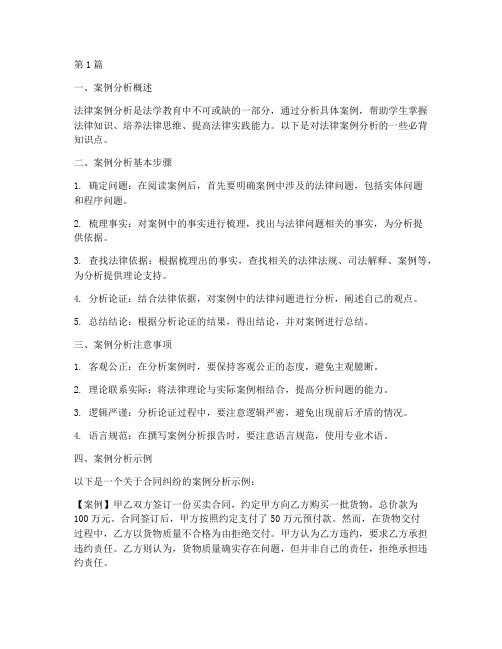
一、案例分析概述法律案例分析是法学教育中不可或缺的一部分,通过分析具体案例,帮助学生掌握法律知识、培养法律思维、提高法律实践能力。
以下是对法律案例分析的一些必背知识点。
二、案例分析基本步骤1. 确定问题:在阅读案例后,首先要明确案例中涉及的法律问题,包括实体问题和程序问题。
2. 梳理事实:对案例中的事实进行梳理,找出与法律问题相关的事实,为分析提供依据。
3. 查找法律依据:根据梳理出的事实,查找相关的法律法规、司法解释、案例等,为分析提供理论支持。
4. 分析论证:结合法律依据,对案例中的法律问题进行分析,阐述自己的观点。
5. 总结结论:根据分析论证的结果,得出结论,并对案例进行总结。
三、案例分析注意事项1. 客观公正:在分析案例时,要保持客观公正的态度,避免主观臆断。
2. 理论联系实际:将法律理论与实际案例相结合,提高分析问题的能力。
3. 逻辑严谨:分析论证过程中,要注意逻辑严密,避免出现前后矛盾的情况。
4. 语言规范:在撰写案例分析报告时,要注意语言规范,使用专业术语。
四、案例分析示例以下是一个关于合同纠纷的案例分析示例:【案例】甲乙双方签订一份买卖合同,约定甲方向乙方购买一批货物,总价款为100万元。
合同签订后,甲方按照约定支付了50万元预付款。
然而,在货物交付过程中,乙方以货物质量不合格为由拒绝交付。
甲方认为乙方违约,要求乙方承担违约责任。
乙方则认为,货物质量确实存在问题,但并非自己的责任,拒绝承担违约责任。
1. 确定问题:本案涉及的法律问题是合同纠纷,具体包括违约责任的承担。
2. 梳理事实:甲方已按照合同约定支付了50万元预付款,乙方拒绝交付货物,认为货物质量不合格。
3. 查找法律依据:根据《中华人民共和国合同法》第一百零七条规定,当事人一方不履行合同义务或者履行合同义务不符合约定的,应当承担继续履行、采取补救措施或者赔偿损失等违约责任。
4. 分析论证:本案中,乙方拒绝交付货物,构成违约行为。
普通法 案例分析笔记
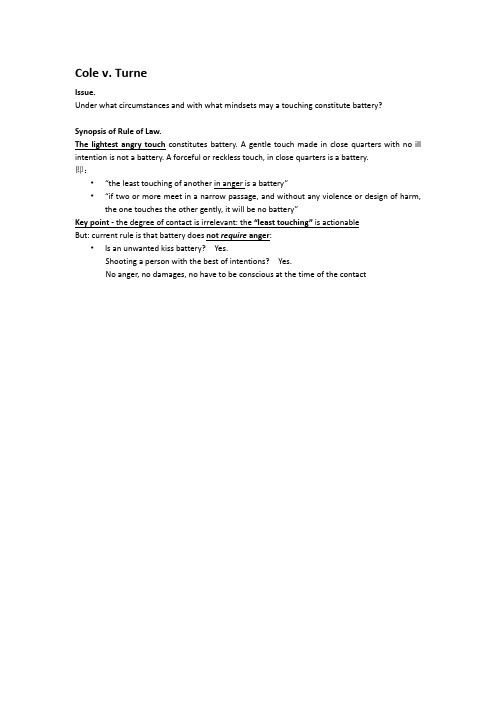
Cole v. TurneIssue.Under what circumstances and with what mindsets may a touching constitute battery?Synopsis of Rule of Law.The lightest angry touch constitutes battery. A gentle touch made in close quarters with no ill intention is not a battery. A forceful or reckless touch, in close quarters is a battery.即:•“the least touching of another in anger is a battery”•“if two or more meet in a narrow pas sage, and without any violence or design of harm, the one touches the other gently, it will be no battery”Key point - the degree of contact is irrelevant: the“least touching” is actionableBut: current rule is that battery does not require anger:•Is an unwanted kiss battery? Yes.Shooting a person with the best of intentions? Yes.No anger, no damages, no have to be conscious at the time of the contactCollins v Wilcock [1984] 3 All ER 374FACT:A police woman took hold of a woman's arm to stop her walking off when she was questioning her. The woman scratched the police woman and was charged with assaulting a police officer in the course of her duty.Me:thedefendant refused to answer police woman’s question and walked away when police woman persisted to follow herand took hold of her arm to restrain her. The defendant swore at and scratched the officer’s arm, As a result, the D was arrested and charged with assaulting a police officer in the course of her duty.Issue:whether officer can physically hold suspect without arrest?(P3)Holding:officer’ action is unlawful and amounted to a battery since it went beyond the generally acceotable conduct of touching a person to engage his attention. The defendant's action was therefore in self defence and D’s conviction was quashed(撤销).Rule: unless there is an arrest, officer cannot use physical force to hold a suspect, and such force may constitute tort of batterySidaway v. Bethlem Royal Hospital Governors (1985 HLs)Facts:Claimant suffered persistent pain in her neck, right shoulder, and arms.Claimant consented to the neurosurgeon’s recommended treatment of cervical cord decompression. Doctor did tell her even if the operation properly performed, risk of disturbing a nerve root/consequences. But doctor not explain the fact that in less than 1% of the cases, the decompression treatment caused spinal cord damage, paraplegia. Doctor also not informed the plaintiff that this was an op eration of choice or "elective operation“ (she didn’t need to have it) Plaintiff patient developed paraplegia after the spinal operationCasebook:MrsSiddeway suffered persisitent pain in her right arm and shoulder and a surgeon employed by the defendants recommended an operation to her spine to which Mrssidawat consented. The operation involved a risk,put at least 1%, of damage to the spine and MrsSidawat was not informed of the risk ,The operation was properly conducted but unfortunately the risk materialized and the clainmanr became severely disabled.She sue the defendants on the groud that surgeon had failed to inform her of riskHeld:dismissing the appeal ,that the defendant were not liable.Rule and notable points of law:Unlike US law, in English law consent not vitiated by the failure of the doctor to give the patient sufficient information before the consent is givenOnly if the consent is obtained by fraud or by misrepresentation it could be said that consent is not a true consent, allow batteryPatient’s consent must still be real: to be real patient should be told enough about the treatment to understand what will be done to themCasebook: at the same time the doctor is not entitled to make the final decision with regard to treatment which may have disadvantages or dangers , where the patient’s heath and future are stake ,the patient must make the final decision. Thus, the right to make the final decision and the duty of the doctor to inform the patient if the treatment may have the special disadvantages or dangers go hand in hand.●infliction of bodily restraint, which is not expressly or impliedly authorized by the law●Any restraint of liberty, and can occur anywhere (not just a prison)●R estraint must be completeBird v. Jones, 7 Ad. & El. (N.S.) 742, 115 Eng. Rep. 688 (1845).Case Summary为了演出而限制人流—原告强行进去—不让原告进入,但允许原告撤退—不构成非法拘禁Facts: part of Hammersmith Bridge, ordinarily used as a public footway, had been closed for spectators of a boat race. Bird (P) wanted to enter but he was prevented by Jones (D) and other policemen because he had not paid the admission fee.Defendants refused to let him go forward but would allow him to retrace his steps. P refused to leaveand was in the enclosure for half hour. Bird sued Jones for false imprisonment.Issue: Can a party be liable for false imprisonment if he only partially restricts the movement of another such that a way out is available?Holding and Rule: No. P could have left but chose not to. D did not totally restrict his movements. D merely did not allow P to go where he wanted to go.Rule and notable points of law:Did not constitute false imprisonment as the plaintiff could have left the area another way Merely obstructing someone’s way is not false imprisonment if the plaintiff has another means of going out (egress)When a person is restrained, there need not be actual physical restraint,e g:an arrest,even if executed by merely touching the claimant,is a restraint as it would be if a person has the physical capatity to leave but it is unreasonable to expect him to do so.McFadzean v. Construction Forestry Mining and Energy Union (2007 Australia, Supreme Court of Victoria – Court of Appeal)Fact:见PPT 75Rule:Four criteria to determine whether egress is reasonable: threat or danger to self/property (e.g., jumping out of moving truck not reasonable, para. 58), distance and time, and legalityRobinson V Balmain New FerryFacts:The P had contracted with D to enter their wharf & stay there till the boat should start , and then be taken by the boat to other side. after entry P changed mind and wish to go backwithout payment of prescribed fee , which was required by D P was prevented to leave and sued D for false imprisonment.Judgment: There was no false imprisonment.Reason- P had the contractual obligation to pay fees to leave , D was reasonable to restrain P if he refuse to pay money.a.Trespasses to the person:Battery = (per Trindale)•direct act by the defendant•which has the effect of causing contact with the body of the plaintiff•without the plaintiff’s consent(English) Protection from Harassment Act 1977•Prohibits a course of conduct which amounts to harassment which the defendant knows or ought to know amounts to harassment•“Harassment” is not defined, but includes “alarming the person or causing the person distress”, and speech can qualify as h arassment•Remedies: civil action – damages, injunction•Damages can be awarded for (just) anxiety or financial lossMalcomson Nicholas Hugh Bertram v Naresh Kumar Metha前员工骚扰前雇主Fact:The defendant was the former employee of the second plaintiff company and had resigned from his employment, the first plaintiff was the chief executive officer of the secondplaintiff,thedefendant desired to regain his employment,and when that was not forthcoming he engaged in a series of acts designed to harass both plaintiffs.Issue:能否用harassment 起诉Hold: The plaintiff had no recognizable tort under which to sue the defendant .firstly,they could not sue under the traditional tort of trespass to the person in assault or battery.because:Trespass定义:could apply to acts of the defendant that interfered with the plaintiffs’ use and right of enjoyment of landApply: But some of the emails, phone calls and SMS messages by mobile phone sent to the first plaintiff and to the employees of company had been received or retrieved by them outside company’s premises, and in the case of the first plaintiff, outside his home and outside the office Trespass (and nuisance) could not applyHarassment定义:harassement defined as ‘a course of conduct by a person, whether by words or action, directly or through third parties, sufficiently repetitive in nature as would cause, andwhich he ought reasonably to know would cause, worry, emotional distress or annoyance to another person’ (at 464, para 31)本案中:Judge noted advances in communications technology meant that persons minded to harass no longer need to be within sight or hearing of the victim in order to achieve their object, and that mobile phones, faxes and email could be harnessed towards the object of harassment, with the result that ‘life can be unbearable’AXA Insurance Singapore Pte Ltd v Chandran s/o NatesanFact:the plaintiff was an insurance company,it allgeged that the defendant persistently sent e-mails and made phone calls to its employees and lawyers using vulgar and threatening language. It was those circumstances that the plaintiff sued the defendant under the tort of harassment.Result:The High court rejected the plaintiff’s contention on three grounds: the first was that the tort of harassment was not pleaded by the plaintiff ,secondly, the court doubted whether the plaintiff could sue on behalf of its employees ,thirdly, and more substantively, the court was not convinced that there was a tort of harassment in Singapore.。
常规法律案例分析(3篇)
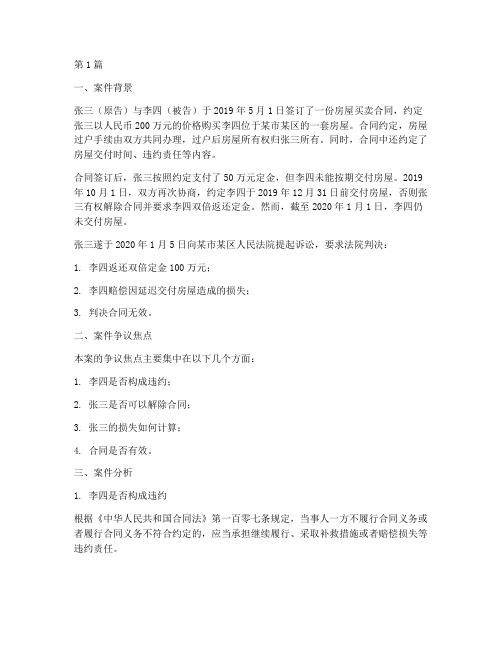
第1篇一、案件背景张三(原告)与李四(被告)于2019年5月1日签订了一份房屋买卖合同,约定张三以人民币200万元的价格购买李四位于某市某区的一套房屋。
合同约定,房屋过户手续由双方共同办理,过户后房屋所有权归张三所有。
同时,合同中还约定了房屋交付时间、违约责任等内容。
合同签订后,张三按照约定支付了50万元定金,但李四未能按期交付房屋。
2019年10月1日,双方再次协商,约定李四于2019年12月31日前交付房屋,否则张三有权解除合同并要求李四双倍返还定金。
然而,截至2020年1月1日,李四仍未交付房屋。
张三遂于2020年1月5日向某市某区人民法院提起诉讼,要求法院判决:1. 李四返还双倍定金100万元;2. 李四赔偿因延迟交付房屋造成的损失;3. 判决合同无效。
二、案件争议焦点本案的争议焦点主要集中在以下几个方面:1. 李四是否构成违约;2. 张三是否可以解除合同;3. 张三的损失如何计算;4. 合同是否有效。
三、案件分析1. 李四是否构成违约根据《中华人民共和国合同法》第一百零七条规定,当事人一方不履行合同义务或者履行合同义务不符合约定的,应当承担继续履行、采取补救措施或者赔偿损失等违约责任。
在本案中,李四未能按照合同约定的时间交付房屋,已构成违约。
因此,法院应认定李四违约。
2. 张三是否可以解除合同根据《中华人民共和国合同法》第一百零九条规定,当事人一方明确表示或者以自己的行为表明不履行合同义务的,对方可以在履行期限届满之前要求其承担违约责任。
在本案中,李四未能按期交付房屋,且在协商过程中未能履行交付义务,已经构成严重违约。
根据合同约定,张三有权解除合同。
因此,法院应支持张三解除合同的请求。
3. 张三的损失如何计算根据《中华人民共和国合同法》第一百一十四条规定,当事人一方不履行合同义务或者履行合同义务不符合约定的,造成对方损失的,应当赔偿损失。
在本案中,张三因李四未能按期交付房屋,导致其无法入住和使用房屋,造成了一定的经济损失。
关于一般法律案例的分析(3篇)
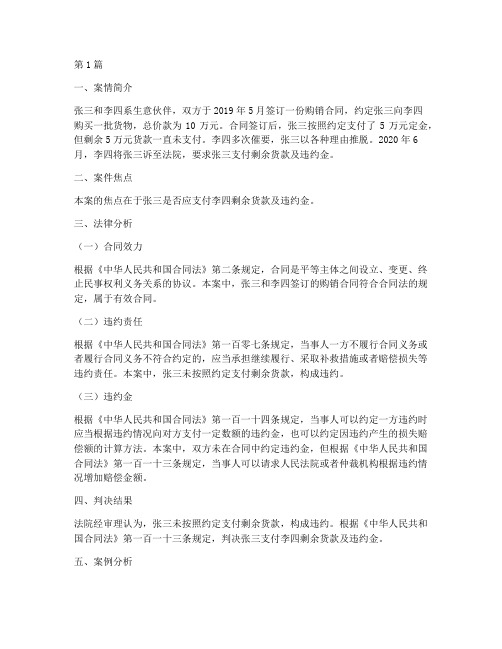
第1篇一、案情简介张三和李四系生意伙伴,双方于2019年5月签订一份购销合同,约定张三向李四购买一批货物,总价款为10万元。
合同签订后,张三按照约定支付了5万元定金,但剩余5万元货款一直未支付。
李四多次催要,张三以各种理由推脱。
2020年6月,李四将张三诉至法院,要求张三支付剩余货款及违约金。
二、案件焦点本案的焦点在于张三是否应支付李四剩余货款及违约金。
三、法律分析(一)合同效力根据《中华人民共和国合同法》第二条规定,合同是平等主体之间设立、变更、终止民事权利义务关系的协议。
本案中,张三和李四签订的购销合同符合合同法的规定,属于有效合同。
(二)违约责任根据《中华人民共和国合同法》第一百零七条规定,当事人一方不履行合同义务或者履行合同义务不符合约定的,应当承担继续履行、采取补救措施或者赔偿损失等违约责任。
本案中,张三未按照约定支付剩余货款,构成违约。
(三)违约金根据《中华人民共和国合同法》第一百一十四条规定,当事人可以约定一方违约时应当根据违约情况向对方支付一定数额的违约金,也可以约定因违约产生的损失赔偿额的计算方法。
本案中,双方未在合同中约定违约金,但根据《中华人民共和国合同法》第一百一十三条规定,当事人可以请求人民法院或者仲裁机构根据违约情况增加赔偿金额。
四、判决结果法院经审理认为,张三未按照约定支付剩余货款,构成违约。
根据《中华人民共和国合同法》第一百一十三条规定,判决张三支付李四剩余货款及违约金。
五、案例分析本案涉及合同效力、违约责任和违约金等方面。
以下是对本案的详细分析:1. 合同效力:本案中,张三和李四签订的购销合同符合合同法的规定,属于有效合同。
双方在签订合同时,应当遵守合同约定,履行合同义务。
2. 违约责任:张三未按照约定支付剩余货款,构成违约。
根据合同法的规定,张三应当承担违约责任,向李四支付剩余货款及违约金。
3. 违约金:本案中,双方未在合同中约定违约金,但根据合同法的规定,李四可以请求人民法院或者仲裁机构根据违约情况增加赔偿金额。
法律案例分析必背知识点(3篇)

第1篇一、案例分析概述1. 案例分析的定义:案例分析是对具体法律案件进行深入研究和分析的过程,通过对案例事实的剖析,探讨法律问题的解决方法和法律适用原则。
2. 案例分析的目的:提高法律思维和实务操作能力,加深对法律知识的理解,培养解决实际法律问题的能力。
3. 案例分析的步骤:事实分析、法律分析、论证和结论。
二、案例分析必备知识点1. 法律事实(1)法律事实的定义:法律事实是指能够引起法律关系产生、变更或消灭的客观现象。
(2)法律事实的分类:法律事实分为法律行为和法律事件。
(3)法律事实的认定:分析案例时,要准确认定案件事实,包括主体、客体和内容。
2. 法律关系(1)法律关系的定义:法律关系是法律规范在调整社会关系过程中形成的权利义务关系。
(2)法律关系的要素:主体、客体和内容。
(3)法律关系的产生、变更和消灭:分析案例时,要明确法律关系的产生、变更和消灭原因。
3. 法律规范(1)法律规范的定义:法律规范是国家制定或认可,用以调整社会关系的具有普遍约束力的行为准则。
(2)法律规范的种类:成文法和不成文法。
(3)法律规范的效力:法律规范的效力分为一般效力和特别效力。
4. 法律责任(1)法律责任的定义:法律责任是指法律关系主体因违反法律规定而应当承担的法律后果。
(2)法律责任的形式:民事责任、行政责任、刑事责任。
(3)责任能力的认定:分析案例时,要判断当事人是否具有责任能力。
5. 法律解释(1)法律解释的定义:法律解释是对法律规范含义的说明和阐释。
(2)法律解释的种类:文义解释、立法解释、司法解释。
(3)法律解释的方法:目的解释、体系解释、比较解释。
6. 法律程序(1)法律程序的定义:法律程序是法律规范在实施过程中所遵循的步骤和方式。
(2)法律程序的种类:立法程序、司法程序、行政程序。
(3)法律程序的效力:法律程序具有独立效力,不得随意变更。
7. 国际法(1)国际法的定义:国际法是调整国家之间关系的法律规范。
法律案例及案例分析笔记(3篇)
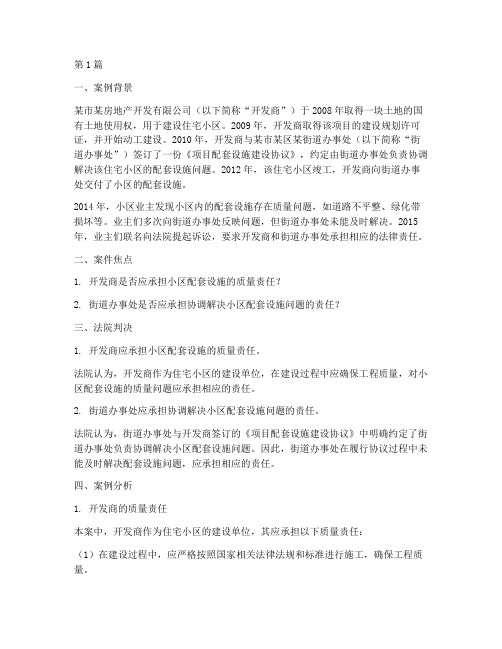
第1篇一、案例背景某市某房地产开发有限公司(以下简称“开发商”)于2008年取得一块土地的国有土地使用权,用于建设住宅小区。
2009年,开发商取得该项目的建设规划许可证,并开始动工建设。
2010年,开发商与某市某区某街道办事处(以下简称“街道办事处”)签订了一份《项目配套设施建设协议》,约定由街道办事处负责协调解决该住宅小区的配套设施问题。
2012年,该住宅小区竣工,开发商向街道办事处交付了小区的配套设施。
2014年,小区业主发现小区内的配套设施存在质量问题,如道路不平整、绿化带损坏等。
业主们多次向街道办事处反映问题,但街道办事处未能及时解决。
2015年,业主们联名向法院提起诉讼,要求开发商和街道办事处承担相应的法律责任。
二、案件焦点1. 开发商是否应承担小区配套设施的质量责任?2. 街道办事处是否应承担协调解决小区配套设施问题的责任?三、法院判决1. 开发商应承担小区配套设施的质量责任。
法院认为,开发商作为住宅小区的建设单位,在建设过程中应确保工程质量,对小区配套设施的质量问题应承担相应的责任。
2. 街道办事处应承担协调解决小区配套设施问题的责任。
法院认为,街道办事处与开发商签订的《项目配套设施建设协议》中明确约定了街道办事处负责协调解决小区配套设施问题。
因此,街道办事处在履行协议过程中未能及时解决配套设施问题,应承担相应的责任。
四、案例分析1. 开发商的质量责任本案中,开发商作为住宅小区的建设单位,其应承担以下质量责任:(1)在建设过程中,应严格按照国家相关法律法规和标准进行施工,确保工程质量。
(2)对已交付的配套设施,应承担维修、保养等责任,确保配套设施的正常使用。
(3)在业主发现配套设施存在问题后,应积极配合业主解决问题,及时采取措施进行修复。
2. 街道办事处的协调责任本案中,街道办事处与开发商签订的《项目配套设施建设协议》明确约定了街道办事处负责协调解决小区配套设施问题。
因此,街道办事处在履行协议过程中应承担以下责任:(1)及时了解业主对配套设施的需求,协调相关部门解决问题。
关于一般法律案例的分析(3篇)
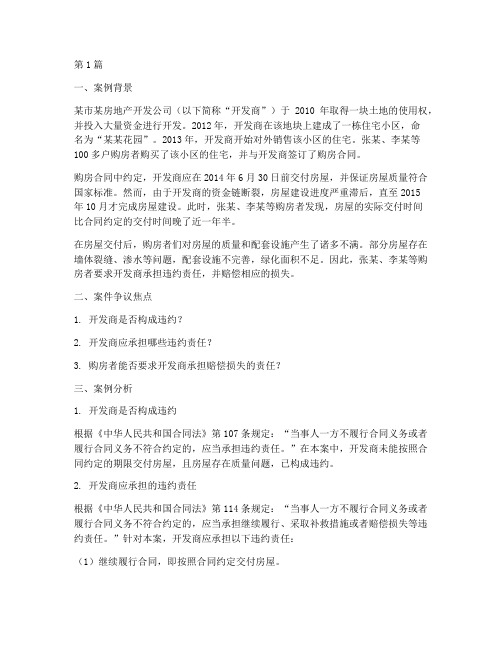
第1篇一、案例背景某市某房地产开发公司(以下简称“开发商”)于2010年取得一块土地的使用权,并投入大量资金进行开发。
2012年,开发商在该地块上建成了一栋住宅小区,命名为“某某花园”。
2013年,开发商开始对外销售该小区的住宅。
张某、李某等100多户购房者购买了该小区的住宅,并与开发商签订了购房合同。
购房合同中约定,开发商应在2014年6月30日前交付房屋,并保证房屋质量符合国家标准。
然而,由于开发商的资金链断裂,房屋建设进度严重滞后,直至2015年10月才完成房屋建设。
此时,张某、李某等购房者发现,房屋的实际交付时间比合同约定的交付时间晚了近一年半。
在房屋交付后,购房者们对房屋的质量和配套设施产生了诸多不满。
部分房屋存在墙体裂缝、渗水等问题,配套设施不完善,绿化面积不足。
因此,张某、李某等购房者要求开发商承担违约责任,并赔偿相应的损失。
二、案件争议焦点1. 开发商是否构成违约?2. 开发商应承担哪些违约责任?3. 购房者能否要求开发商承担赔偿损失的责任?三、案例分析1. 开发商是否构成违约根据《中华人民共和国合同法》第107条规定:“当事人一方不履行合同义务或者履行合同义务不符合约定的,应当承担违约责任。
”在本案中,开发商未能按照合同约定的期限交付房屋,且房屋存在质量问题,已构成违约。
2. 开发商应承担的违约责任根据《中华人民共和国合同法》第114条规定:“当事人一方不履行合同义务或者履行合同义务不符合约定的,应当承担继续履行、采取补救措施或者赔偿损失等违约责任。
”针对本案,开发商应承担以下违约责任:(1)继续履行合同,即按照合同约定交付房屋。
(2)采取补救措施,即修复房屋存在的质量问题。
(3)赔偿损失,包括:①因延期交付房屋给购房者造成的利息损失;②因房屋质量问题给购房者造成的经济损失;③因配套设施不完善给购房者造成的损失。
3. 购房者能否要求开发商承担赔偿损失的责任根据《中华人民共和国合同法》第113条规定:“当事人一方不履行合同义务或者履行合同义务不符合约定的,给对方造成损失的,损失赔偿额应当相当于因违约所造成的损失,包括合同履行后可以获得的利益,但不得超过违反合同一方订立合同时预见到或者应当预见到的因违反合同可能造成的损失。
学习笔记模板:法律案例分析与解读
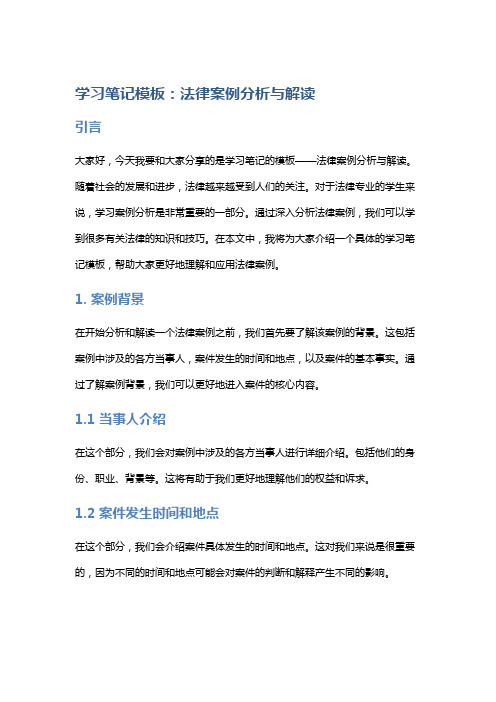
学习笔记模板:法律案例分析与解读引言大家好,今天我要和大家分享的是学习笔记的模板——法律案例分析与解读。
随着社会的发展和进步,法律越来越受到人们的关注。
对于法律专业的学生来说,学习案例分析是非常重要的一部分。
通过深入分析法律案例,我们可以学到很多有关法律的知识和技巧。
在本文中,我将为大家介绍一个具体的学习笔记模板,帮助大家更好地理解和应用法律案例。
1. 案例背景在开始分析和解读一个法律案例之前,我们首先要了解该案例的背景。
这包括案例中涉及的各方当事人,案件发生的时间和地点,以及案件的基本事实。
通过了解案例背景,我们可以更好地进入案件的核心内容。
1.1 当事人介绍在这个部分,我们会对案例中涉及的各方当事人进行详细介绍。
包括他们的身份、职业、背景等。
这将有助于我们更好地理解他们的权益和诉求。
1.2 案件发生时间和地点在这个部分,我们会介绍案件具体发生的时间和地点。
这对我们来说是很重要的,因为不同的时间和地点可能会对案件的判断和解释产生不同的影响。
1.3 案件的基本事实在这个部分,我们会列举案件的基本事实。
这包括发生的事件、相关证据和争议点等。
了解案件的基本事实是进行案例分析的基础,它会影响我们的判断和解释。
2. 法律问题在这个部分,我们会明确案例中的法律问题。
法律问题是案例分析的核心,它决定了我们要从哪个角度去分析案件。
了解法律问题有助于我们更好地理解和解读案例。
3. 相关法律规定在这个部分,我们会介绍与案件相关的法律规定。
法律规定是我们进行案例分析的基础,也是我们解决法律问题的依据。
通过了解相关法律规定,我们可以更好地判断和解释案例。
4. 核心争议与论点在这个部分,我们会分析案件中的核心争议和各方的论点。
核心争议是案件解决的焦点,各方的论点是他们解决争议的理由和依据。
通过分析核心争议和论点,我们可以更好地理解案件的复杂性和争议性。
5. 审判过程与结果在这个部分,我们会介绍案件的审判过程和最终的结果。
普通法的案例
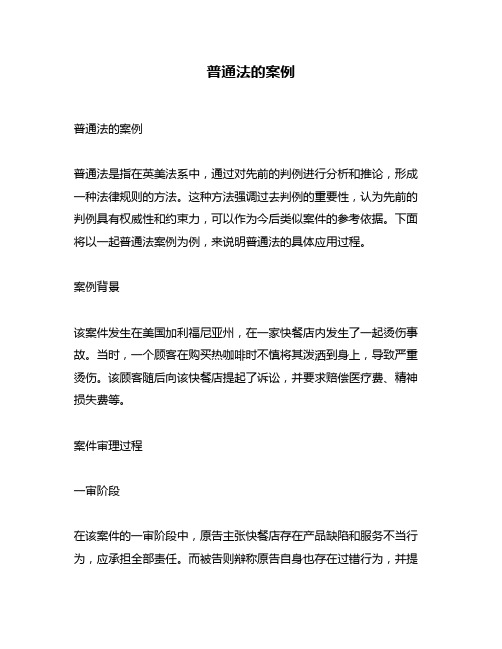
普通法的案例普通法的案例普通法是指在英美法系中,通过对先前的判例进行分析和推论,形成一种法律规则的方法。
这种方法强调过去判例的重要性,认为先前的判例具有权威性和约束力,可以作为今后类似案件的参考依据。
下面将以一起普通法案例为例,来说明普通法的具体应用过程。
案例背景该案件发生在美国加利福尼亚州,在一家快餐店内发生了一起烫伤事故。
当时,一个顾客在购买热咖啡时不慎将其泼洒到身上,导致严重烫伤。
该顾客随后向该快餐店提起了诉讼,并要求赔偿医疗费、精神损失费等。
案件审理过程一审阶段在该案件的一审阶段中,原告主张快餐店存在产品缺陷和服务不当行为,应承担全部责任。
而被告则辩称原告自身也存在过错行为,并提出第三方责任降低自己承担的责任比例。
二审阶段在二审阶段中,法院首先审查了该案件的相关法律规定和先前的判例,发现加利福尼亚州存在一条“严格产品责任法”,该法规定在商品制造或供应过程中,如果存在产品缺陷,就必须承担相应的赔偿责任。
同时,法院还参考了一些类似案例的判决结果,发现在这些案例中,被告都被认定为存在产品缺陷和服务不当行为,并需要承担全部责任。
最终判决综合考虑上述因素,法院最终作出了如下判决:被告快餐店存在产品缺陷和服务不当行为,并需要承担全部责任。
同时,原告也存在部分过错行为,应减轻被告赔偿的比例。
最终赔偿金额为50万美元。
案例分析本案是一个典型的普通法案例,在整个审理过程中,法院都强调对先前判例的重要性,并通过对先前类似案件的分析和推论来形成自己的判决结果。
具体而言,在该案件中,法院首先查阅了加利福尼亚州相关法律规定和先前类似案件的判决结果,并结合实际情况进行综合分析,最终作出了判决结果。
在这个过程中,普通法的优势得到了充分体现。
通过对先前判例的研究和应用,法院可以更好地保证判决的公正性和权威性,并避免因个人主观因素而导致的失误。
同时,普通法还可以促进司法实践的稳定和连续性,使得类似案件在不同时间、不同地点得到相似的处理结果。
普通法律案件分析(3篇)
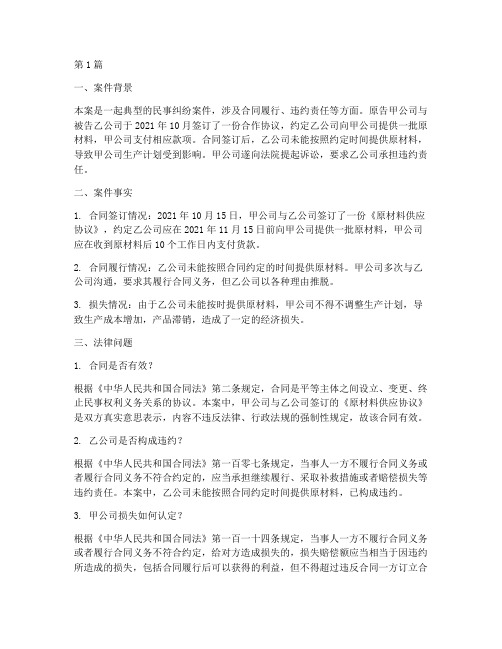
第1篇一、案件背景本案是一起典型的民事纠纷案件,涉及合同履行、违约责任等方面。
原告甲公司与被告乙公司于2021年10月签订了一份合作协议,约定乙公司向甲公司提供一批原材料,甲公司支付相应款项。
合同签订后,乙公司未能按照约定时间提供原材料,导致甲公司生产计划受到影响。
甲公司遂向法院提起诉讼,要求乙公司承担违约责任。
二、案件事实1. 合同签订情况:2021年10月15日,甲公司与乙公司签订了一份《原材料供应协议》,约定乙公司应在2021年11月15日前向甲公司提供一批原材料,甲公司应在收到原材料后10个工作日内支付货款。
2. 合同履行情况:乙公司未能按照合同约定的时间提供原材料。
甲公司多次与乙公司沟通,要求其履行合同义务,但乙公司以各种理由推脱。
3. 损失情况:由于乙公司未能按时提供原材料,甲公司不得不调整生产计划,导致生产成本增加,产品滞销,造成了一定的经济损失。
三、法律问题1. 合同是否有效?根据《中华人民共和国合同法》第二条规定,合同是平等主体之间设立、变更、终止民事权利义务关系的协议。
本案中,甲公司与乙公司签订的《原材料供应协议》是双方真实意思表示,内容不违反法律、行政法规的强制性规定,故该合同有效。
2. 乙公司是否构成违约?根据《中华人民共和国合同法》第一百零七条规定,当事人一方不履行合同义务或者履行合同义务不符合约定的,应当承担继续履行、采取补救措施或者赔偿损失等违约责任。
本案中,乙公司未能按照合同约定时间提供原材料,已构成违约。
3. 甲公司损失如何认定?根据《中华人民共和国合同法》第一百一十四条规定,当事人一方不履行合同义务或者履行合同义务不符合约定,给对方造成损失的,损失赔偿额应当相当于因违约所造成的损失,包括合同履行后可以获得的利益,但不得超过违反合同一方订立合同时预见到或者应当预见到的因违反合同可能造成的损失。
本案中,甲公司因乙公司违约而遭受的损失包括生产成本增加、产品滞销等,应依法予以赔偿。
法律案例摘抄笔记(3篇)

第1篇一、案例背景本案涉及一起合同纠纷,原告(甲公司)与被告(乙公司)签订了一份合作协议,约定甲公司向乙公司提供货物,乙公司支付相应货款。
然而,在履行合同过程中,双方因货款支付问题发生争议,甲公司遂向法院提起诉讼。
二、案件争议焦点1. 甲公司是否已履行了合同约定的义务。
2. 乙公司是否已按照合同约定支付了货款。
3. 双方是否存在违约行为,以及违约责任如何承担。
三、法院审理过程1. 原告主张:甲公司已按照合同约定提供了货物,乙公司未按期支付货款,构成违约。
2. 被告辩称:乙公司已支付部分货款,剩余货款因甲公司提供的货物存在质量问题,故拒绝支付。
3. 法院调查:法院依法调查了双方提供的证据,包括合同、货物验收报告、付款凭证等。
四、法院判决1. 关于甲公司履行义务的问题:法院认为,甲公司提供的货物与合同约定相符,已履行了合同约定的义务。
2. 关于乙公司支付货款的问题:法院认为,乙公司虽已支付部分货款,但仍有部分货款未支付,构成违约。
3. 关于违约责任承担的问题:法院认为,乙公司未按期支付货款,构成违约,应承担相应的违约责任。
鉴于甲公司提供的货物质量符合合同约定,乙公司无权以货物质量问题为由拒绝支付货款。
五、案例分析1. 合同履行原则:本案中,甲公司已按照合同约定提供了货物,履行了合同义务。
乙公司未按期支付货款,违反了合同约定。
2. 违约责任承担:根据《中华人民共和国合同法》第一百零七条规定,当事人一方不履行合同义务或者履行合同义务不符合约定的,应当承担继续履行、采取补救措施或者赔偿损失等违约责任。
本案中,乙公司未按期支付货款,应承担相应的违约责任。
3. 证据认定:本案中,法院依法调查了双方提供的证据,包括合同、货物验收报告、付款凭证等,确保了案件审理的公正性。
六、启示1. 合同当事人应严格按照合同约定履行义务,确保合同的顺利履行。
2. 在合同履行过程中,如发生争议,应及时协商解决,避免纠纷扩大。
3. 当事人应妥善保管证据,以便在发生争议时,能够依法维护自己的合法权益。
法考案例分析法律知识点(3篇)
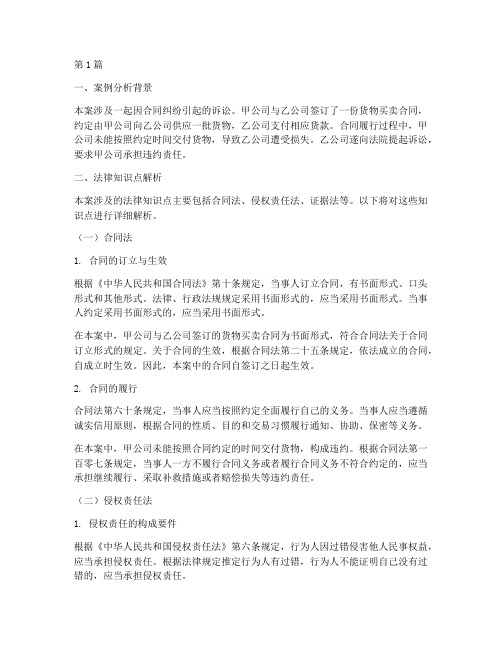
第1篇一、案例分析背景本案涉及一起因合同纠纷引起的诉讼。
甲公司与乙公司签订了一份货物买卖合同,约定由甲公司向乙公司供应一批货物,乙公司支付相应货款。
合同履行过程中,甲公司未能按照约定时间交付货物,导致乙公司遭受损失。
乙公司遂向法院提起诉讼,要求甲公司承担违约责任。
二、法律知识点解析本案涉及的法律知识点主要包括合同法、侵权责任法、证据法等。
以下将对这些知识点进行详细解析。
(一)合同法1. 合同的订立与生效根据《中华人民共和国合同法》第十条规定,当事人订立合同,有书面形式、口头形式和其他形式。
法律、行政法规规定采用书面形式的,应当采用书面形式。
当事人约定采用书面形式的,应当采用书面形式。
在本案中,甲公司与乙公司签订的货物买卖合同为书面形式,符合合同法关于合同订立形式的规定。
关于合同的生效,根据合同法第二十五条规定,依法成立的合同,自成立时生效。
因此,本案中的合同自签订之日起生效。
2. 合同的履行合同法第六十条规定,当事人应当按照约定全面履行自己的义务。
当事人应当遵循诚实信用原则,根据合同的性质、目的和交易习惯履行通知、协助、保密等义务。
在本案中,甲公司未能按照合同约定的时间交付货物,构成违约。
根据合同法第一百零七条规定,当事人一方不履行合同义务或者履行合同义务不符合约定的,应当承担继续履行、采取补救措施或者赔偿损失等违约责任。
(二)侵权责任法1. 侵权责任的构成要件根据《中华人民共和国侵权责任法》第六条规定,行为人因过错侵害他人民事权益,应当承担侵权责任。
根据法律规定推定行为人有过错,行为人不能证明自己没有过错的,应当承担侵权责任。
在本案中,甲公司未能按照合同约定履行交付货物的义务,导致乙公司遭受损失。
甲公司的行为构成侵权,应承担侵权责任。
2. 侵权责任的承担方式根据侵权责任法第十六条规定,侵权人应当承担停止侵害、排除妨碍、消除危险、返还财产、恢复原状、赔偿损失、赔礼道歉等民事责任。
在本案中,甲公司应承担赔偿损失的责任,赔偿乙公司因其违约行为所遭受的损失。
法律典型案例评析笔记(3篇)
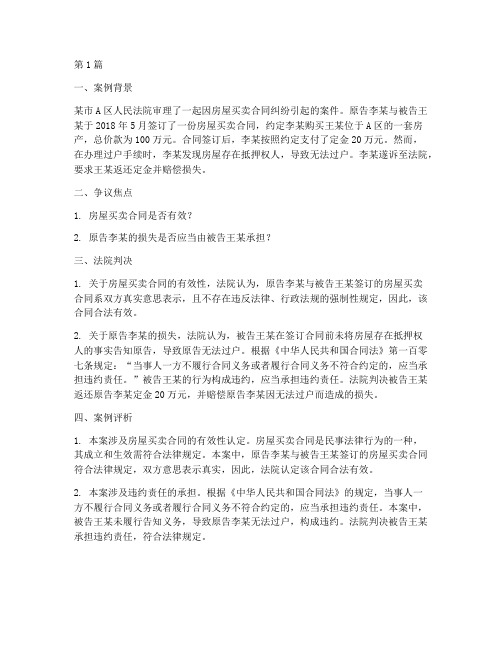
第1篇一、案例背景某市A区人民法院审理了一起因房屋买卖合同纠纷引起的案件。
原告李某与被告王某于2018年5月签订了一份房屋买卖合同,约定李某购买王某位于A区的一套房产,总价款为100万元。
合同签订后,李某按照约定支付了定金20万元。
然而,在办理过户手续时,李某发现房屋存在抵押权人,导致无法过户。
李某遂诉至法院,要求王某返还定金并赔偿损失。
二、争议焦点1. 房屋买卖合同是否有效?2. 原告李某的损失是否应当由被告王某承担?三、法院判决1. 关于房屋买卖合同的有效性,法院认为,原告李某与被告王某签订的房屋买卖合同系双方真实意思表示,且不存在违反法律、行政法规的强制性规定,因此,该合同合法有效。
2. 关于原告李某的损失,法院认为,被告王某在签订合同前未将房屋存在抵押权人的事实告知原告,导致原告无法过户。
根据《中华人民共和国合同法》第一百零七条规定:“当事人一方不履行合同义务或者履行合同义务不符合约定的,应当承担违约责任。
”被告王某的行为构成违约,应当承担违约责任。
法院判决被告王某返还原告李某定金20万元,并赔偿原告李某因无法过户而造成的损失。
四、案例评析1. 本案涉及房屋买卖合同的有效性认定。
房屋买卖合同是民事法律行为的一种,其成立和生效需符合法律规定。
本案中,原告李某与被告王某签订的房屋买卖合同符合法律规定,双方意思表示真实,因此,法院认定该合同合法有效。
2. 本案涉及违约责任的承担。
根据《中华人民共和国合同法》的规定,当事人一方不履行合同义务或者履行合同义务不符合约定的,应当承担违约责任。
本案中,被告王某未履行告知义务,导致原告李某无法过户,构成违约。
法院判决被告王某承担违约责任,符合法律规定。
3. 本案涉及定金返还问题。
根据《中华人民共和国担保法》的规定,当事人可以约定一方向对方给付定金作为债权的担保。
本案中,原告李某已按照约定支付了定金。
由于被告王某违约,法院判决被告王某返还定金,符合法律规定。
法律案例分析归纳总结(3篇)
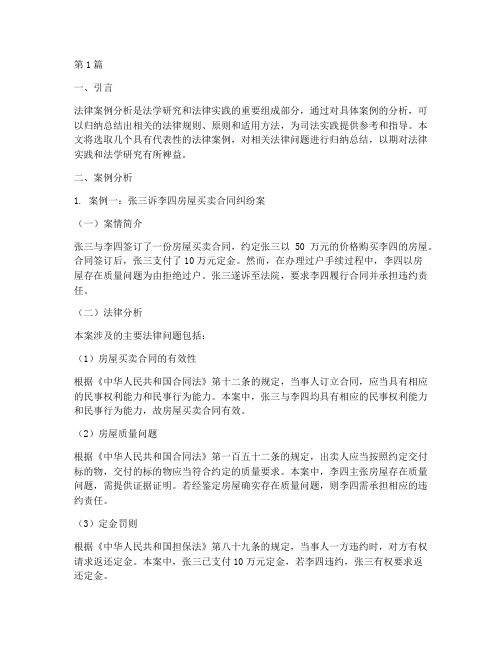
第1篇一、引言法律案例分析是法学研究和法律实践的重要组成部分,通过对具体案例的分析,可以归纳总结出相关的法律规则、原则和适用方法,为司法实践提供参考和指导。
本文将选取几个具有代表性的法律案例,对相关法律问题进行归纳总结,以期对法律实践和法学研究有所裨益。
二、案例分析1. 案例一:张三诉李四房屋买卖合同纠纷案(一)案情简介张三与李四签订了一份房屋买卖合同,约定张三以50万元的价格购买李四的房屋。
合同签订后,张三支付了10万元定金。
然而,在办理过户手续过程中,李四以房屋存在质量问题为由拒绝过户。
张三遂诉至法院,要求李四履行合同并承担违约责任。
(二)法律分析本案涉及的主要法律问题包括:(1)房屋买卖合同的有效性根据《中华人民共和国合同法》第十二条的规定,当事人订立合同,应当具有相应的民事权利能力和民事行为能力。
本案中,张三与李四均具有相应的民事权利能力和民事行为能力,故房屋买卖合同有效。
(2)房屋质量问题根据《中华人民共和国合同法》第一百五十二条的规定,出卖人应当按照约定交付标的物,交付的标的物应当符合约定的质量要求。
本案中,李四主张房屋存在质量问题,需提供证据证明。
若经鉴定房屋确实存在质量问题,则李四需承担相应的违约责任。
(3)定金罚则根据《中华人民共和国担保法》第八十九条的规定,当事人一方违约时,对方有权请求返还定金。
本案中,张三已支付10万元定金,若李四违约,张三有权要求返还定金。
(三)判决结果法院经审理认为,李四未能提供证据证明房屋存在质量问题,故判决李四履行合同,办理过户手续,并承担违约责任,退还张三定金。
2. 案例二:王五诉赵六侵权责任纠纷案(一)案情简介王五在公园散步时,被赵六饲养的狗咬伤。
王五遂诉至法院,要求赵六承担侵权责任,赔偿医疗费、精神损害抚慰金等费用。
(二)法律分析本案涉及的主要法律问题包括:(1)侵权责任的构成要件根据《中华人民共和国侵权责任法》第六条的规定,行为人因过错侵害他人民事权益,应当承担侵权责任。
法律案例及案例分析笔记(3篇)
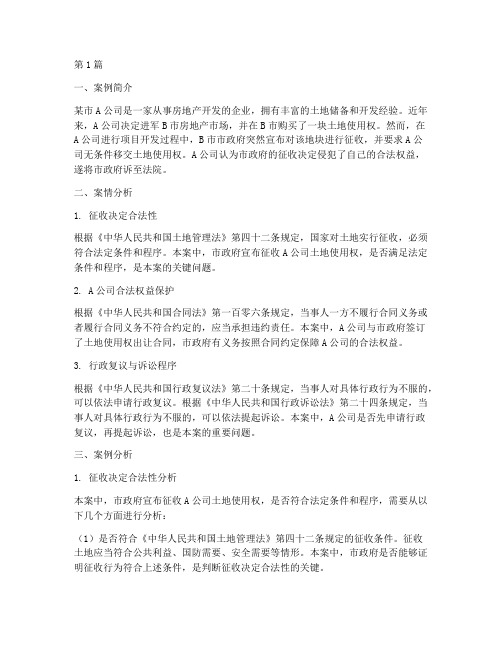
第1篇一、案例简介某市A公司是一家从事房地产开发的企业,拥有丰富的土地储备和开发经验。
近年来,A公司决定进军B市房地产市场,并在B市购买了一块土地使用权。
然而,在A公司进行项目开发过程中,B市市政府突然宣布对该地块进行征收,并要求A公司无条件移交土地使用权。
A公司认为市政府的征收决定侵犯了自己的合法权益,遂将市政府诉至法院。
二、案情分析1. 征收决定合法性根据《中华人民共和国土地管理法》第四十二条规定,国家对土地实行征收,必须符合法定条件和程序。
本案中,市政府宣布征收A公司土地使用权,是否满足法定条件和程序,是本案的关键问题。
2. A公司合法权益保护根据《中华人民共和国合同法》第一百零六条规定,当事人一方不履行合同义务或者履行合同义务不符合约定的,应当承担违约责任。
本案中,A公司与市政府签订了土地使用权出让合同,市政府有义务按照合同约定保障A公司的合法权益。
3. 行政复议与诉讼程序根据《中华人民共和国行政复议法》第二十条规定,当事人对具体行政行为不服的,可以依法申请行政复议。
根据《中华人民共和国行政诉讼法》第二十四条规定,当事人对具体行政行为不服的,可以依法提起诉讼。
本案中,A公司是否先申请行政复议,再提起诉讼,也是本案的重要问题。
三、案例分析1. 征收决定合法性分析本案中,市政府宣布征收A公司土地使用权,是否符合法定条件和程序,需要从以下几个方面进行分析:(1)是否符合《中华人民共和国土地管理法》第四十二条规定的征收条件。
征收土地应当符合公共利益、国防需要、安全需要等情形。
本案中,市政府是否能够证明征收行为符合上述条件,是判断征收决定合法性的关键。
(2)征收程序是否合法。
根据《中华人民共和国土地管理法》第四十三条规定,征收土地应当依法进行公告、调查、评估、补偿等程序。
本案中,市政府是否履行了上述程序,是判断征收决定合法性的关键。
2. A公司合法权益保护分析本案中,A公司与市政府签订了土地使用权出让合同,根据《中华人民共和国合同法》第一百零六条规定,市政府有义务按照合同约定保障A公司的合法权益。
法律典型案例分析笔记(3篇)
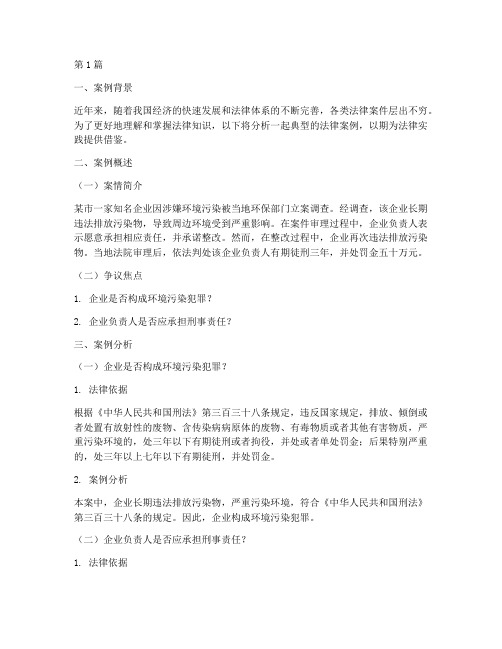
第1篇一、案例背景近年来,随着我国经济的快速发展和法律体系的不断完善,各类法律案件层出不穷。
为了更好地理解和掌握法律知识,以下将分析一起典型的法律案例,以期为法律实践提供借鉴。
二、案例概述(一)案情简介某市一家知名企业因涉嫌环境污染被当地环保部门立案调查。
经调查,该企业长期违法排放污染物,导致周边环境受到严重影响。
在案件审理过程中,企业负责人表示愿意承担相应责任,并承诺整改。
然而,在整改过程中,企业再次违法排放污染物。
当地法院审理后,依法判处该企业负责人有期徒刑三年,并处罚金五十万元。
(二)争议焦点1. 企业是否构成环境污染犯罪?2. 企业负责人是否应承担刑事责任?三、案例分析(一)企业是否构成环境污染犯罪?1. 法律依据根据《中华人民共和国刑法》第三百三十八条规定,违反国家规定,排放、倾倒或者处置有放射性的废物、含传染病病原体的废物、有毒物质或者其他有害物质,严重污染环境的,处三年以下有期徒刑或者拘役,并处或者单处罚金;后果特别严重的,处三年以上七年以下有期徒刑,并处罚金。
2. 案例分析本案中,企业长期违法排放污染物,严重污染环境,符合《中华人民共和国刑法》第三百三十八条的规定。
因此,企业构成环境污染犯罪。
(二)企业负责人是否应承担刑事责任?1. 法律依据根据《中华人民共和国刑法》第三百三十八条规定,单位犯罪的,对单位判处罚金,并对其直接负责的主管人员和其他直接责任人员,依照各该条的规定处罚。
2. 案例分析本案中,企业负责人作为企业直接负责的主管人员,对企业的违法行为负有直接责任。
根据《中华人民共和国刑法》第三百三十八条的规定,企业负责人应承担刑事责任。
四、案例启示1. 企业应严格遵守环保法律法规,切实履行环境保护责任。
2. 相关部门应加强对企业的监管,严厉打击环境污染违法行为。
3. 法律机关应依法审理环境污染案件,维护国家法律权威和社会公共利益。
4. 企业负责人应增强法律意识,自觉遵守法律法规,履行社会责任。
法律案例分析必背知识点(3篇)

第1篇一、案例分析概述1. 案例分析的定义:案例分析是对具体法律问题或案件进行深入分析和研究的过程,旨在提高法律思维能力和实际操作能力。
2. 案例分析的目的:(1)帮助学习者理解法律原理和法律规定;(2)培养法律思维,提高分析问题和解决问题的能力;(3)提高法律实践操作能力,为今后从事法律工作打下基础。
3. 案例分析的方法:(1)逻辑分析法:运用逻辑推理,对案件事实进行归纳、演绎和类比;(2)比较分析法:将案件事实与法律规定、同类案例进行比较,找出异同点;(3)实证分析法:对案件事实进行实证研究,分析案件背后的社会背景、法律政策等。
二、案例分析必备知识点1. 法律基本概念(1)法律的定义:法律是国家制定或认可,并由国家强制力保证实施的,调整社会关系的规范性文件。
(2)法律的特征:规范性、普遍性、强制性、时效性。
(3)法律体系:宪法、行政法、民法、刑法、经济法、诉讼法等。
2. 法律关系(1)法律关系的定义:法律关系是指法律规范在调整社会关系的过程中形成的权利义务关系。
(2)法律关系的要素:主体、客体、内容。
(3)法律关系的种类:债权关系、物权关系、人身关系、继承关系等。
3. 法律行为(1)法律行为的定义:法律行为是指法律主体在法律关系中为实现一定目的而实施的行为。
(2)法律行为的特征:合法性、自愿性、目的性。
(3)法律行为的种类:民事行为、行政行为、刑事行为等。
4. 法律责任(1)法律责任的定义:法律责任是指法律主体因违反法律规定而应承担的法律后果。
(2)法律责任的特征:强制性、惩罚性、补偿性。
(3)法律责任种类:民事责任、行政责任、刑事责任。
5. 案例分析中的证据规则(1)证据的定义:证据是证明案件事实的材料。
(2)证据的种类:书证、物证、视听资料、证人证言、当事人陈述、鉴定意见、勘验笔录等。
(3)证据规则:合法、真实、关联、充分。
6. 案例分析中的诉讼程序(1)诉讼程序的定义:诉讼程序是指法律规定的,当事人为实现诉讼目的而进行的一系列诉讼活动。
法律典型案例评析笔记(3篇)
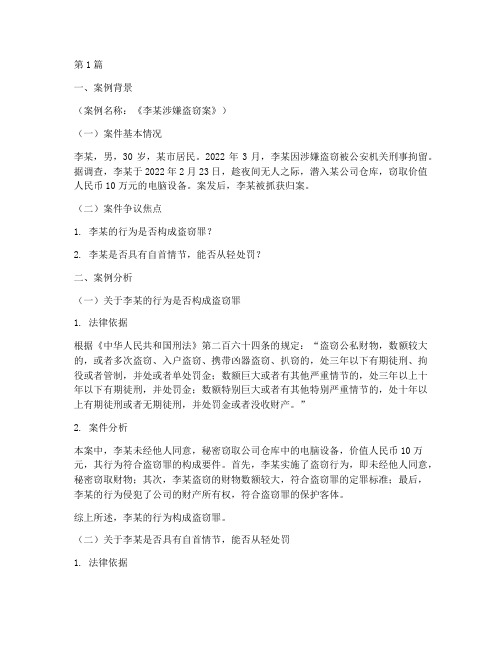
第1篇一、案例背景(案例名称:《李某涉嫌盗窃案》)(一)案件基本情况李某,男,30岁,某市居民。
2022年3月,李某因涉嫌盗窃被公安机关刑事拘留。
据调查,李某于2022年2月23日,趁夜间无人之际,潜入某公司仓库,窃取价值人民币10万元的电脑设备。
案发后,李某被抓获归案。
(二)案件争议焦点1. 李某的行为是否构成盗窃罪?2. 李某是否具有自首情节,能否从轻处罚?二、案例分析(一)关于李某的行为是否构成盗窃罪1. 法律依据根据《中华人民共和国刑法》第二百六十四条的规定:“盗窃公私财物,数额较大的,或者多次盗窃、入户盗窃、携带凶器盗窃、扒窃的,处三年以下有期徒刑、拘役或者管制,并处或者单处罚金;数额巨大或者有其他严重情节的,处三年以上十年以下有期徒刑,并处罚金;数额特别巨大或者有其他特别严重情节的,处十年以上有期徒刑或者无期徒刑,并处罚金或者没收财产。
”2. 案件分析本案中,李某未经他人同意,秘密窃取公司仓库中的电脑设备,价值人民币10万元,其行为符合盗窃罪的构成要件。
首先,李某实施了盗窃行为,即未经他人同意,秘密窃取财物;其次,李某盗窃的财物数额较大,符合盗窃罪的定罪标准;最后,李某的行为侵犯了公司的财产所有权,符合盗窃罪的保护客体。
综上所述,李某的行为构成盗窃罪。
(二)关于李某是否具有自首情节,能否从轻处罚1. 法律依据根据《中华人民共和国刑法》第六十七条的规定:“犯罪以后自动投案,如实供述自己的罪行的,是自首。
对于自首的犯罪分子,可以从轻或者减轻处罚;其中,犯罪较轻的,可以免除处罚。
”2. 案件分析本案中,李某在被公安机关抓获后,如实供述了自己的犯罪事实,符合自首的构成要件。
首先,李某在案发后主动投案,没有逃避侦查;其次,李某如实供述了自己的犯罪行为,没有隐瞒事实;最后,李某的行为符合自首的时间、地点、方式和内容要求。
因此,李某具有自首情节,可以从轻处罚。
三、判决结果根据以上分析,法院依法判决李某犯盗窃罪,判处有期徒刑三年,并处罚金人民币五万元。
法律案例摘抄分析(3篇)
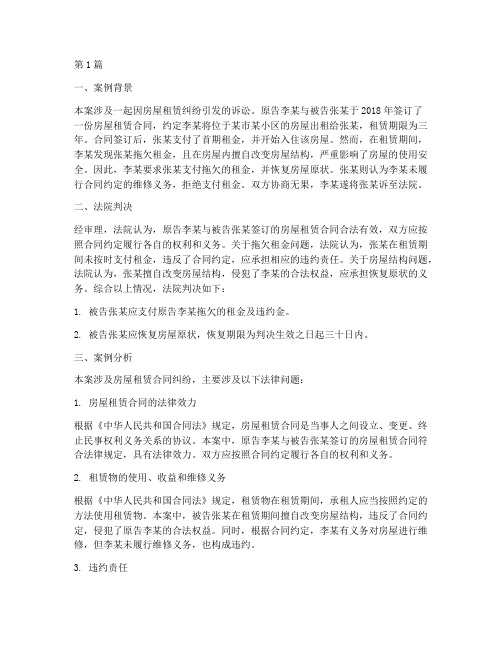
第1篇一、案例背景本案涉及一起因房屋租赁纠纷引发的诉讼。
原告李某与被告张某于2018年签订了一份房屋租赁合同,约定李某将位于某市某小区的房屋出租给张某,租赁期限为三年。
合同签订后,张某支付了首期租金,并开始入住该房屋。
然而,在租赁期间,李某发现张某拖欠租金,且在房屋内擅自改变房屋结构,严重影响了房屋的使用安全。
因此,李某要求张某支付拖欠的租金,并恢复房屋原状。
张某则认为李某未履行合同约定的维修义务,拒绝支付租金。
双方协商无果,李某遂将张某诉至法院。
二、法院判决经审理,法院认为,原告李某与被告张某签订的房屋租赁合同合法有效,双方应按照合同约定履行各自的权利和义务。
关于拖欠租金问题,法院认为,张某在租赁期间未按时支付租金,违反了合同约定,应承担相应的违约责任。
关于房屋结构问题,法院认为,张某擅自改变房屋结构,侵犯了李某的合法权益,应承担恢复原状的义务。
综合以上情况,法院判决如下:1. 被告张某应支付原告李某拖欠的租金及违约金。
2. 被告张某应恢复房屋原状,恢复期限为判决生效之日起三十日内。
三、案例分析本案涉及房屋租赁合同纠纷,主要涉及以下法律问题:1. 房屋租赁合同的法律效力根据《中华人民共和国合同法》规定,房屋租赁合同是当事人之间设立、变更、终止民事权利义务关系的协议。
本案中,原告李某与被告张某签订的房屋租赁合同符合法律规定,具有法律效力。
双方应按照合同约定履行各自的权利和义务。
2. 租赁物的使用、收益和维修义务根据《中华人民共和国合同法》规定,租赁物在租赁期间,承租人应当按照约定的方法使用租赁物。
本案中,被告张某在租赁期间擅自改变房屋结构,违反了合同约定,侵犯了原告李某的合法权益。
同时,根据合同约定,李某有义务对房屋进行维修,但李某未履行维修义务,也构成违约。
3. 违约责任根据《中华人民共和国合同法》规定,当事人一方不履行合同义务或者履行合同义务不符合约定的,应当承担违约责任。
本案中,被告张某拖欠租金、擅自改变房屋结构,均构成违约。
- 1、下载文档前请自行甄别文档内容的完整性,平台不提供额外的编辑、内容补充、找答案等附加服务。
- 2、"仅部分预览"的文档,不可在线预览部分如存在完整性等问题,可反馈申请退款(可完整预览的文档不适用该条件!)。
- 3、如文档侵犯您的权益,请联系客服反馈,我们会尽快为您处理(人工客服工作时间:9:00-18:30)。
Cole v. TurneIssue。
Under what circumstances and with what mindsets may a touching constitute battery?Synopsis of Rule of Law。
The lightest angry touch constitutes battery。
A gentle touch made in close quarters with no ill intention is not a battery. A forceful or reckless touch, in close quarters is a battery。
即:•“the least touching of another in anger is a battery”•“if two or more meet in a narrow passage,and without any violence or design of harm,the one touches the other gently,it will be no battery"Key point — the degree of contact is irrelevant: the “least touching” is actionableBut:current rule is that battery does not require anger:•Is an unwanted kiss battery?Yes.Shooting a person with the best of intentions? Yes.No anger, no damages,no have to be conscious at the time of the contactCollins v Wilcock [1984] 3 All ER 374FACT:A police woman took hold of a woman's arm to stop her walking off when she was questioning her. The woman scratched the police woman and was charged with assaulting a police officer in the course of her duty。
Me:the defendant refused to answer police woman’s question and walked away when police woman persisted to follow her and took hold of her arm to restrain her。
The defendant swore at and scratched the officer’s arm, As a result,the D was arrested and charged with assaulting a police officer in the course of her duty.Issue:whether officer can physically hold suspect without arrest?(P3)Holding:officer’ action is unlawful and amounted to a battery since it went beyond the generally acceotable conduct of touching a person to engage his attention。
The defendant's action was therefore in self defence and D’s conviction was quashed(撤销).Rule: unless there is an arrest, officer cannot use physical force to hold a suspect, and such force may constitute tort of batterySidaway v. Bethlem Royal Hospital Governors (1985 HLs)Facts:Claimant suffered persistent pain in her neck,right shoulder, and arms.Claimant consented to the neurosurgeon’s recommended treatment of cervical cord decompression。
Doctor did tell her even if the operation properly performed,risk of disturbing a nerve root/consequences. But doctor not explain the fact that in less than 1% of the cases,the decompression treatment caused spinal cord damage, paraplegia. Doctor also not informed the plaintiff that this was an operation of choice or "elective operation“ (she didn't need to have it) Plaintiff patient developed paraplegia after the spinal operationCasebook:Mrs Siddeway suffered persisitent pain in her right arm and shoulder and a surgeon employed by the defendants recommended an operation to her spine to which Mrs sidawat consented。
The operation involved a risk,put at least 1%,of damage to the spine and Mrs Sidawat was not informed of the risk ,The operation was properly conducted but unfortunately the risk materialized and the clainmanr became severely disabled.She sue the defendants on the groud that surgeon had failed to inform her of riskHeld:dismissing the appeal ,that the defendant were not liable。
Rule and notable points of law:Unlike US law, in English law consent not vitiated by the failure of the doctor to give the patient sufficient information before the consent is givenOnly if the consent is obtained by fraud or by misrepresentation it could be said that consent is not a true consent,allow batteryPatient’s consent must still be real:to be real patient should be told enough about the treatment to understand what will be done to themCasebook:at the same time the doctor is not entitled to make the final decision with regard to treatment which may have disadvantages or dangers , where the patient’s heath and future are stake ,the patient must make the final decision. Thus,the right to make the final decision and the duty of the doctor to inform the patient if the treatment may have the special disadvantages or dangers go hand in hand。
●infliction of bodily restraint, which is not expressly or impliedly authorized by the law●Any restraint of liberty,and can occur anywhere (not just a prison)●R estraint must be completeBird v. Jones, 7 Ad. &El. (N.S。
) 742,115 Eng. Rep。
688 (1845).Case Summary为了演出而限制人流-原告强行进去—不让原告进入,但允许原告撤退—不构成非法拘禁Facts:part of Hammersmith Bridge, ordinarily used as a public footway,had been closed for spectators of a boat race。
Bird (P)wanted to enter but he was prevented by Jones (D) and other policemen because he had not paid the admission fee。
